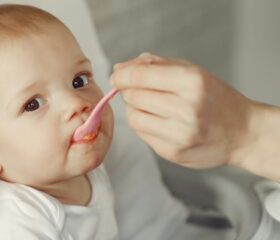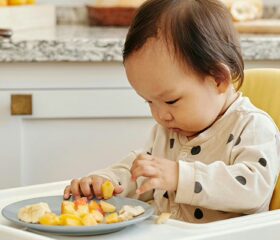Breastfeeding Diet: What to Eat and Avoid for a Healthy Baby
By now, you’ve probably heard a lot of conflicting info on what’s okay and not okay to eat while you’re breastfeeding.

What you eat impacts your breast milk and influences your baby’s development. The good news is that while breastfeeding does come with some dietary considerations, you’ll have a little more freedom than during pregnancy.
Here’s a guide to the dos and don’ts of a healthy breastfeeding diet.
Why your diet matters during breastfeeding
A well-balanced postpartum diet offers a lot of positives for both you and your baby’s immediate and long-term health, even in areas you may not expect.
Your postpartum recovery
After childbirth, your body needs a top-up of nutrients and an extra 300 to 500 daily calories to heal, ease postpartum pains like constipation, stabilize your mood, and replenish your energy stores and milk supply. 1 2 3
These numbers may be even higher if you’re breastfeeding more than one kid or engaging in more than 45 minutes of daily aerobic exercise. 4
To fuel your nutrient stores, eat a balanced diet with enough:
- Protein
- Omega-3 fatty acids
- Calcium
- Iron
- Folic acid
All of this will make sure you have what you need to get through each day while making enough milk. 5 4
Many women also continue to take their prenatal vitamins for weeks after labor and delivery, while others switch to postnatal options. Ask your doctor what’s best for you.
Note for vegetarians and vegans
If you’re a vegetarian or vegan, you’ll probably need supplements for B12 and omega-3 in addition to other multivitamins. This will ensure you get all the nutrition you need for breastfeeding. 6 7
Your baby’s development
A healthy diet will boost the quality and quantity of your breast milk, which will benefit your baby’s growth. 5
Pay attention to what you eat, as breastfeeding supports the development of your baby’s brain, nervous system, and immune system. It will also decrease his risk of chronic illnesses when he’s older, and will possibly help him stay at a healthy weight in adulthood. 8 9
Does breastfeeding make you lose weight?
Many women think (and hope) that breastfeeding will lead to weight loss during the postpartum period. The logic is easy to follow—after all, when your body produces milk, it will burn extra calories.
The truth is that breastfeeding exclusively until your baby’s 3 months old to 6 months old can help you lose weight. However, you may also lose no weight at all, or even gain weight; that depends on whether what you eat outweighs your increased energy consumption, as well as your hormonal levels. 10
Don’t stress yourself out trying to count calories. Work with your doctor to make sure that you’re getting all the nutrients you need to curb your hunger and maintain your energy levels.
What to eat and drink while breastfeeding
As mentioned, you’ll need various nutrients to keep your body in tip-top condition while you’re breastfeeding.
Let’s check out in more detail which nutrients, foods, and drinks to add to your plate:
Protein-rich foods
Protein builds, repairs, and maintains your body tissue, which benefits both you and your baby’s health.
You’ll need around 65 grams of protein per day. Get it from at least two to three daily servings of foods such as: 11 5 12
- Lean meats (e.g., chicken, turkey, and pork)
- Eggs
- High-protein yogurt, like Greek yogurt
- Legumes, lentils, or beans
- Nuts, seeds, and derivative products like nut butter
- Cheese
- Tofu
Whole grains
Try to get 6 ounces of fiber-rich complex carbohydrates like: 2 12
- Oatmeal
- Brown rice
- Barley
- Bulgur (parboiled cracked wheat)
- Whole-wheat bread and pasta
- Quinoa
- Millet
Fruits and vegetables
Don’t skimp on your veggies! Make sure that around half of your plate consists of fruits and vegetables. 13 Load up on five servings daily of fresh, frozen, canned, and dried fruit and vegetables.
You can also enjoy up to 150 ml of unsweetened juice or smoothies per day (look for ones that are 100% juice). 14
Citrus fruits and veggies (broccoli, potatoes, bell peppers, cabbage) are also great sources of vitamin C, which you need 120 mg of per day. 13
Water and beverages
It might sound obvious, but you should drink whenever you’re thirsty.
Your body uses a lot of water to make milk; you’ll lose about 25 ounces of fluid a day from it. 15 Make sure you drink around 16 cups of water daily to replenish your milk supply. 16
A good rule of thumb is to have a glass of water or an unsweetened drink with every nursing session. Skip beverages with a lot of added sugar, like sodas and sports drinks. 12
Other important nutrients
Pay attention to these other nutrients for a well-balanced diet:
- Calcium: You’ll temporarily lose 3–5% of your bone mass when you’re breastfeeding. 11 Try to get about 1,300 mg of calcium daily from milk, cheese, and yogurt. 13 17 Non-dairy sources of calcium include broccoli, spinach, almonds, and oranges.
- Vitamin D: This helps your body absorb calcium, and you’ll need 400–1,000 international units (IU) of it a day. 11 Try getting 10–15 minutes of sunlight if you have lighter skin or 25–40 minutes if you’re darker. 18 Dietary sources include salmon, fortified milk, and orange juice. 11 Note that vitamin D is one of the few vitamins that isn’t transferred through breast milk, so you will still need to supplement your baby with 400–600 IU daily through the use of infant drops.
- Omega-3s: These “healthy fats” are important to your baby’s brain and eye development. 11 They’re found in chia and flax seeds, but fish is probably the most popular source. 5 Eat two to three servings (8–12 ounces) of seafood each week from lower mercury choices, such as wild salmon, sardines, crabs, and shrimp. 19
- Choline: This nutrient plays a part in developing your baby’s brain and nerves. You’ll need about 550 mg per day while breastfeeding, which you can get from fish, chicken, lean meats, nuts, seeds, beans, and vegetables like broccoli, cauliflower, and potatoes. 20
- Iron: About 9–10 mg of iron a day may reduce postpartum fatigue. You may need more if you had significant blood loss during childbirth or struggled with anemia. 5 13 Good sources of iron include meat, poultry, seafood, legumes (beans, split peas, and lentils), and fortified cereals. 13 21
- Folic acid: You’ll need a daily boost of 400 micrograms of folic acid or its natural alternative, folate. 5 Folic acid and folate boost your (and your baby’s) health and support your baby’s development. You can find them in citrus fruits, green leafy vegetables (like spinach), and beef liver.
You can relax your diet somewhat now that you’re no longer pregnant
You can ease up on many of the hard dietary restrictions from pregnancy. For instance, raw fish like sushi are fair game again, as long as they’re sourced from reputable (and sanitary) places. However, you should still avoid unpasteurized soft cheeses and deli meats (also called cold cuts or lunch meats) for a little longer to protect yourself from listeria. You can let them back into your diet when your baby turns 2 months old.
What to limit or avoid while breastfeeding
Although you’re now able to reintroduce some foods you abstained from during your pregnancy diet, certain foods and substances can still negatively impact your baby:
High-mercury fish
When you’re breastfeeding, mercury can pass from you to your baby. Mercury can result in lower intelligence, memory problems, and other cognitive difficulties for your baby, as well as issues with his gross and fine motor skills. 22
Many kinds of seafood are common sources of mercury, so they’re often included on the list of foods to avoid during pregnancy and the postpartum period. You can eat most types of tuna, but you should limit white (albacore) tuna to 6 ounces weekly. 23 Avoid other fish with high mercury, such as: 19
- Shark
- Orange roughy
- Swordfish
- Marlin
- Bigeye tuna
- Tilefish (Gulf of Mexico)
- King mackerel
As a rule of thumb, the higher a fish is on the food chain, the more likely it is to have mercury.
Herbs and supplements
Be careful with herbal remedies and supplements. Herbs like peppermint, parsley, and sage (when consumed in large quantities) are potential antigalactagogues, meaning they could decrease your milk supply.
Always check in with your doctor before taking any herbal remedies or supplements.
Alcohol
Ideally, you should avoid alcohol completely when you’re breastfeeding. If you really need a drink, wait two or more hours before breastfeeding to give your body time to metabolize the alcohol. 24
Aim for no more than one standard drink a day, meaning one of these options: 25
- 12 ounces of 5% beer.
- 8 ounces of 7% malt liquor.
- 5 ounces of 12% wine.
- 1.5 ounces of 40% (80 proof) liquor (brandy, tequila, gin, rum, vodka, whiskey)
Note that drinking beer doesn’t increase your milk supply, despite what you may have heard. On the contrary, alcohol inhibits your body’s milk-making response when your baby nurses.
Excessive alcohol will decrease your overall milk supply and cause problems with your baby’s sleep, growth, and motor skill development. 26 27
Seaweed
In several cultures, it’s common to eat seaweed soup while breastfeeding because it’s believed to increase milk production. Unfortunately, there’s no scientific evidence for this, and seaweed contains high levels of iodine, which can cause hypothyroidism in babies.
Most of the time, seaweed is a nutritious addition to your diet, but it’s best to avoid it while your baby is breastfeeding.
Caffeine
Caffeine is another option that’s safe in moderation, both while pregnant and breastfeeding. However, you should limit your intake to one or two cups of coffee or tea daily (300 mg or less). 12
Remember that caffeine is also in chocolate bars, sodas, energy drinks, and some pain relievers. Be sure to read the packaging to ensure you’re not going over the daily limit. 15
Excessive caffeine can cause jitteriness, irritability, and sleeplessness in both you and your baby. 28 29 30
What your baby’s reaction to your milk can tell you
Your baby’s reaction to your breastmilk can help you identify what he likes and doesn’t like, and if there are any serious health issues that need addressing. Here’s what to look out for:
- Fussiness: If your baby seems fussy while nursing, it can be a sign that he doesn’t like what you’re eating, especially if it’s garlicky or spicy. That doesn’t necessarily mean you need to cut out these foods. Keeping them in your diet will hopefully get him used to what your family eats and probably won’t cause any real problems.
- Gas (food sensitivities): A gassy baby might be a sign of food sensitivity to something you ate. Try removing potentially problematic foods from your diet one by one to see if that helps. 15
- Food allergies: More severe reactions can indicate an allergy, though this is rare. Only about 2–3% of babies are actually allergic to foods in their moms’ diets. Cow’s milk is the most common offender, followed by soy, peanuts, eggs, wheat, and other nuts. 31 32 33
Again, allergies are rare this early, and breastfeeding exclusively for the first six months of your baby’s life can significantly reduce his risk of developing allergies in the future (especially if your family has a history of them), as well as their severity.
If you want to keep track of your baby’s preferences and food reactions, consider keeping a log in your journal or in a baby tracker app. The best baby trackers let you document mealtimes with pictures and dedicated spaces for notes.
When to call your doctor about your baby’s reactions
Call your doctor if you think your baby is allergic to something you ate. Look for these symptoms after nursing: 31 34
- Diarrhea or bloody poop
- Vomiting
- Poor weight gain
- Eczema, hives, rashes
- Wheezing or difficulty breathing
- Signs of abdominal discomfort, like a swollen belly
- Swollen face, lips, tongue, or throat
How to manage your baby’s allergy going forward
Your doctor may recommend an elimination diet if your baby has an allergic reaction, where you remove all suspected problematic foods from your meals.
You’ll then need to wait 2–4 weeks to see if your baby’s symptoms improve. If they do, you can reintroduce these foods to your diet one at a time to see if your baby has another reaction. 32
Your doctor will provide guidance on how best to adapt this diet to fit your baby’s needs while still meeting your nutritional goals.
Final thoughts
It probably goes without saying, but the best breastfeeding diet is one that nourishes both you and your baby.
Pay attention to your body’s cues, eat a variety of nutrient-rich foods, stay hydrated, and monitor your baby for any adverse reactions. When in doubt, consult your doctor or a registered dietitian for personalized guidance.
Article Sources
- Minnesota Department of Health. "Dietary Intake During Lactation-Topic of the Month" Retrieved August 7, 2025.
- Minnesota Department of Health. "Postpartum Module" Retrieved August 7, 2025.
- University of New Hampshire Extension. "The Importance of Nutrition in Preventing and Mitigating Postpartum Depression" Retrieved August 7, 2025.
- Nutrition Services in Perinatal Care: Second Edition. "Nutritional Concerns of Women in the Preconceptional, Prenatal, and Postpartum Periods" Retrieved August 7, 2025.
- Northwestern Medicine. "Can You Increase Your Breast Milk Supply With Your Diet?" Retrieved August 7, 2025.
- Eunice Kennedy Shriver National Institute of Child Health and Human Development. "When breastfeeding, how many calories should moms and babies consume?" Retrieved August 7, 2025.
- La Leche League International. "Vitamins and Other Nutritional Supplements for Baby" Retrieved August 7, 2025.
- Johns Hopkins Medicine. "Breast Milk Is Best" Retrieved August 7, 2025.
- U.S. Department of Veterans Affairs. "Important breastfeeding information for new Veteran moms" Retrieved August 7, 2025.
- Healthline. "Does Breastfeeding Help You Lose Weight?" Retrieved August 7, 2025.
- American Academy of Pediatrics. "How a Healthy Diet Helps You Breastfeed" Retrieved August 7, 2025.
- Office of Disease Prevention and Health Promotion. "Eat Healthy While Breastfeeding: Quick Tips" Retrieved August 7, 2025.
- University of Utah Health. "Nutrition Guidance for Breastfeeding Women" Retrieved August 7, 2025.
- National Health Service. "Breastfeeding and diet" Retrieved August 7, 2025.
- Johns Hopkins Medicine. "5 Breastfeeding Diet Myths" Retrieved August 7, 2025.
- Academy of Nutrition and Dietetics. "Nursing Your Baby — What You Eat and Drink Matters" Retrieved August 7, 2025.
- University Hospitals. "Educating Breastfeeding Mothers on Proper Diet and Fluid Intake" Retrieved August 7, 2025.
- The British Skin Foundation. "Sunlight and Vitamin D" Retrieved August 7, 2025.
- U.S. Food & Drug Administration. "Advice About Eating Fish" Retrieved August 7, 2025.
- South Dakota WIC. "Choline: Why it is Important for Moms and Kids" Retrieved August 7, 2025.
- Nemours KidsHealth. "Pregnant or Breastfeeding? Nutrients You Need" Retrieved August 7, 2025.
- U.S. Centers for Disease Control and Prevention. "Mercury and Breastfeeding" Retrieved August 7, 2025.
- Alabama Public Health. "What Should I Eat?" Retrieved August 7, 2025.
- U.S. Centers for Disease Control and Prevention. "Alcohol" Retrieved August 7, 2025.
- U.S. Centers for Disease Control and Prevention. "About Standard Drink Sizes" Retrieved August 7, 2025.
- Colorado WIC. "Special Supplemental Nutrition Program For Women, Infants, and Children" Retrieved August 7, 2025.
- National Health Service. "Breastfeeding and drinking alcohol" Retrieved August 7, 2025.
- Healthline. "Caffeine While Breastfeeding: How Much Can You Safely Have?" Retrieved August 7, 2025.
- Drugs and Lactation Database (LactMed®). "Caffeine" Retrieved August 7, 2025.
- Minnesota WIC. "Nutrition for Breast/Chestfeeding" Retrieved August 7, 2025.
- American Academy of Pediatrics. "Infant Allergies and Food Sensitivities" Retrieved August 7, 2025.
- South Dakota State University. "Maternal Diet During Lactation and Breastfeeding" Retrieved August 7, 2025.
- Michigan State University. "A breastfeeding mother’s diet for an infant with colic" Retrieved August 7, 2025.
- Cleveland Clinic. "Can Your Baby Be Allergic to Your Breast Milk?" Retrieved August 7, 2025.






